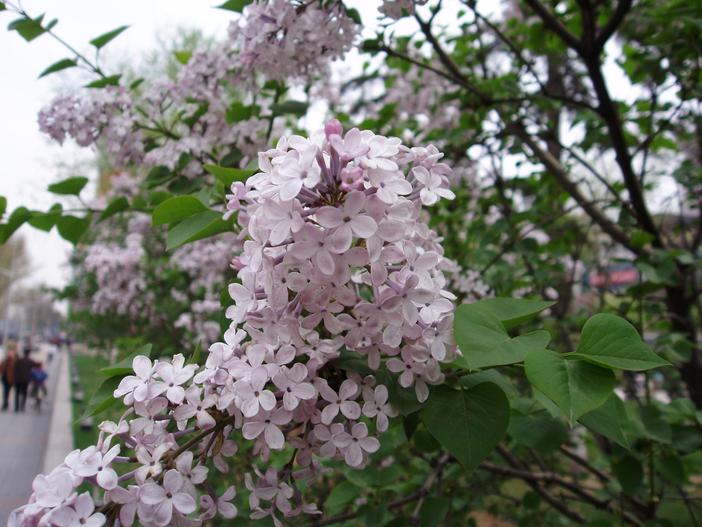Early Blooming Lilac
(Syringa oblata)
Early Blooming Lilac (Syringa oblata)
/
/

Fanghong
CC BY-SA 3.0
Image By:
Fanghong
Recorded By:
Copyright:
CC BY-SA 3.0
Copyright Notice:
Photo by: Fanghong | License Type: CC BY-SA 3.0 | License URL: http://creativecommons.org/licenses/by-sa/3.0/ | Uploader: Fanghong | Publisher: Wikipedia Commons


















Estimated Native Range
Summary
Syringa oblata, commonly known as Early Blooming Lilac, is a deciduous shrub native to the woodland edges and scrublands of North and East Asia, particularly in regions of China and Korea. It typically grows to a height of 3.5 to 5 meters with a similar spread, featuring a multi-stemmed habit that can form a small tree if allowed. The stems vary in texture, with some being glabrous, while others are pubescent or puberulent. New shoots are typically glabrous. This species is notable for its early flowering period, which occurs from April to June, showcasing clusters of fragrant flowers that range in color from purple to violet, and occasionally white. The flowers are highly showy and attract pollinators such as butterflies and bees. The fruit is a smooth capsule that may be obovate-elliptic, ovate, or oblong-lanceolate. Leaves can also vary from glabrous to pubescent, with some becoming glabrescent as they age.
Early Blooming Lilac is valued for its early and fragrant blooms, making it a popular choice for ornamental gardens. It is often used in border plantings, as a specimen shrub, or for hedging. The plant thrives in full sun but can tolerate part shade, and it prefers well-drained soils with consistent moisture. While it is generally easy to maintain, it can be susceptible to powdery mildew and lilac borer. Pruning immediately after flowering helps to maintain its shape and encourage more prolific blooming in the following season. Popular garden cultivars include ’Cheyenne’, which is known for its cold hardiness and ’Betsy Ross’, which has white flowers. Gardeners should be aware that while Early Blooming Lilac is not typically invasive, it can spread through suckering if not managed properly.CC BY-SA 4.0
Early Blooming Lilac is valued for its early and fragrant blooms, making it a popular choice for ornamental gardens. It is often used in border plantings, as a specimen shrub, or for hedging. The plant thrives in full sun but can tolerate part shade, and it prefers well-drained soils with consistent moisture. While it is generally easy to maintain, it can be susceptible to powdery mildew and lilac borer. Pruning immediately after flowering helps to maintain its shape and encourage more prolific blooming in the following season. Popular garden cultivars include ’Cheyenne’, which is known for its cold hardiness and ’Betsy Ross’, which has white flowers. Gardeners should be aware that while Early Blooming Lilac is not typically invasive, it can spread through suckering if not managed properly.CC BY-SA 4.0
Plant Description
- Plant Type: Shrub
- Height: 8-12 feet
- Width: 8-12 feet
- Growth Rate: Moderate
- Flower Color: Pink, Purple, White
- Flowering Season: Spring
- Leaf Retention: Deciduous
Growth Requirements
- Sun: Full Sun, Part Shade
- Water: Medium
- Drainage: Medium
Common Uses
Bee Garden, Bird Garden, Border Plant, Butterfly Garden, Deer Resistant, Drought Tolerant, Fragrant, Hedges, Hummingbird Garden, Low Maintenance, Rabbit Resistant, Showy Flowers, Street Planting
Natural Habitat
Woodland edges and scrublands of North and East Asia
Other Names
Common Names: Broadleaf Lilac , Vårsyren
Scientific Names: Syringa oblata , Syringa dilatata f. alba , Syringa oblata var. oblata , Syringa vulgaris var. oblata
GBIF Accepted Name: Syringa oblata Lindl.